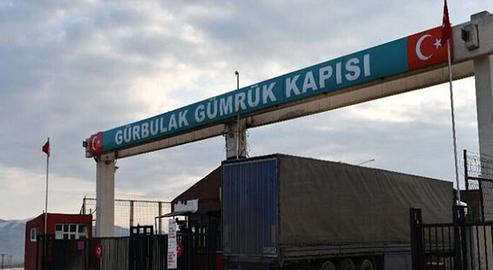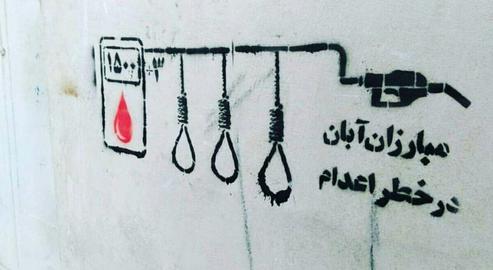On July 23, 2020, news came that the death sentences of three defendants in the November 2019 protests, Amir Hossein Moradi, Mohammad Rajabi and Saeed Tamjidi, had been upheld by the Supreme Court.
Contradictory reactions emerged after the news broke. One “informed source” said that the Young Journalists’ Club, which is affiliated with Iran’s state media, had denied that a death sentence had been handed down. And lawyers for the three defendants reportedly hope that – despite the death sentence apparently being confirmed by the Supreme Court – the Supreme Court would also cancel the verdict.
The three defendants had been sentenced even as two of them, Mohammad Rajabi and Saeed Tamjidi, had left Iran for Turkey at the beginning of December 2019 claiming they were experiencing political persecution. But after spending nearly a month in two different refugee camps, both were returned to Iran by the Turkish Immigration Service and detained by the Evin Prison prosecutor's office the day after their return. Turkey's action in sending the two men back to Iran – since they had claimed to be experiencing persecution and were seeking asylum – may have been illegal and against national and international law.
But how did Rajabi and Tamjidi leave Iran in the first place? And how were they brought back?
A few days after the nationwide November 2019 protests that rocked Iran, Amir Hossein Moradi was arrested; his phone was inspected, and found to include videos of the protests. Moradi was accused of being involved in clashes between protesters and the security forces.
Moradi, who is friends with Mohammad Rajabi and Saeed Tamjidi, later called them from a phone inside prison to tell them their situations were being politicized and that they were to be tried for the November events. He told his friends that security agents were looking for them and that it was better for them to leave Iran.
Rajabi and Tamjidi, along with Shima, a friend of Saeed's, decided to leave Iran; they hired traffickers to help them escape. On November 23, they boarded a bus to Maku in West Azerbaijan province near the Turkish border. They did not succeed in their first attempt to cross the border, on 24 November; a day later, on 25 November, they were able to enter the Turkish city of Van. But a contact who was meant to conduct them to a pre-determined location instead abandoned them on the road. Rajabi, Tamjidi and their friend Shima were 20 kilometres from the city of Antalya.
On November 29, the three were arrested outside Antalya and taken to the city's immigration office. They were asked why they had entered Turkey illegally. They explained that they were being politically persecuted in Iran, that their lives were in danger and that they want to apply for asylum in Turkey.
Officials from the local office of the UN High Commissioner for Refugees (UNHCR) later visited the three and heard their statements. After hearing these, the officials said that the UNHCR could support them in their appeal for political asylum. The Iranians were then accommodated at an Antalya refugee camp.
Under national and international law, in Turkey and any other country, when a person claims to be politically persecuted and endangered in his or her home country, and requests asylum, authorities have a duty to protect their lives and their return is regarded as illegal under international law and human rights norms.
Three weeks after arriving in Turkey, at a new meeting with local officials, Rajabi, Tamjidi and Shima were told that: "All detainees should be returned to Iran on the orders of Recep Tayyip Erdogan, the President of the Republic of Turkey, because Erdogan had a meeting with Hassan Rouhani, the Iranian President, and Rouhani wants the return of detainees. The reason was that these people may have been involved in the Iranian protests."
The reversal came after a recent meeting between Rouhani and Erdogan in Turkey.
Rajabi, Tamjidi and Shima were transferred to the Aghrey camp in Turkey on the night of December 20 and were given papers in Turkish to sign. The three were not informed as to the content of the papers.
Deportation cards in Turkey had previously only been issued in Turkish – however more recently they have been available in Turkish and in the native language of the immigrant or refugee in question. Papers issued in the Turkish language only would now be considered illegal and seen to be abusing the applicants.
All documents related to the cases of Mohammad Rajabi, Saeed Tamjidi and Shima are still available at the Antalya Immigration Office.
They were kept in the Aqhrey camp until December 26 and then returned to Maku, in Iran, with dozens of other migrants and refugees from the Bazargan border. In Maku, at the Detention Center, because Tamjidi and Shima both had passports, they were kept separate from Rajabi, who did not have a passport. Tamjidi and Shima were told they would be released a day later after the on-duty judge could attend o their case.
Officials appear to have not yet known that the three were suspects in a political or security case connected with the November 2019 protests.
Following investigations into the identities of the three men, and the fact that Amir Hossein Moradi, who was convinced that his friends had left Iran, had given information regarding them during his interrogations, officials discovered that Rajabi and Tamjidi were suspects in a political case. Moradi had meanwhile repeatedly stated in court hearings, presided over by Judge Abolghasem Salavati, that interrogations conducted under "threats, pressure and torture” should be deemed invalid under the law.
On December 26, the day after the three would-be migrants were returned to Maku, security agents transferred all three to Tehran. They were transferred to the Evin Prison tribunal on December 27 and tried. The defendants were then denied the right to choose or access their preferred lawyer during interrogations and the trial; or, if they were allowed to choose or access their preferred lawyers, the lawyers was then barred from intervening in legal proceedings on their clients’ behalf.
The result was that the three defendants enjoyed effectively no proper legal representation either during their interrogations or trials before they were sentenced to death. (Shima, the third migrant and a secondary character in this case, was sentenced to a year in prison.) The Court’s decision has yet to be officially announced and lawyers for the three defendants have yet to be allowed to intervene in the case.
IranWire has discovered these details regarding the case by contacting lawyers in Turkey – which is also how it was determined that Rajabi, Tamjidi and Shima were illegally returned to Iran despite the possibility of UNHCR support. Extradition cards printed only in Turkish, or a lack of access to Persian translations, would also have been illegal. And any policy regarding the migrants based on statements by the Turkish or Iranian presidents would also have been outside legal norms – especially because the heads of executive branches cannot rule on judicial matters.
Why would Rajabi and Tamjidi, who had reason to believe they were in danger of political persecution in Iran, have voluntarily returned to the country? Legal sources have also told IranWire that Turkey’s actions in this case are open to a legal challenge.
visit the accountability section
In this section of Iran Wire, you can contact the officials and launch your campaign for various problems




























comments